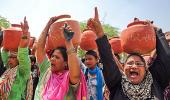The current estimate, however, largely covers only the cost of infrastructure such as pipes, construction of borewells, overhead costs among others and not the expenditure to be incurred on operation and maintenance.

The ministry of Jal Shakti has sought Rs 3.6 trillion from the Centre and states to provide Har Ghar Jal - piped water to all households - by 2024, a senior government official told Business Standard.
The cost of building infrastructure for piped water supply over the next five years has been estimated at Rs 5 trillion, which includes an equal contribution of Rs 1.8 trillion each from states and the Centre.
The remaining amount to be used for “source sustainability” is expected to come through convergence of various government schemes such as the Mahatma Gandhi National Rural Employment Guarantee Scheme (MGNREGS).
The ministry has presented a detailed proposal for the Jal Jeevan Mission to the expenditure finance committee, headed by expenditure secretary, last week and the matter is likely to be taken up by the Cabinet soon, the official said.
The ministry is expecting Rs 1 trillion from MGNREGS alone over the next five years. Funds are also expected to flow in through the 15th Finance Commission for water conservation and piped water connection.
The current estimate, however, largely covers only the cost of infrastructure such as pipes, construction of borewells, overhead costs among others and not the expenditure to be incurred on operation and maintenance.
The Jal Jeevan Mission, announced first by the ruling Bharatiya Janta Party in its election manifesto earlier this year, will be piloted by the drinking water and sanitation department.
Finance Minister Nirmala Sitharaman, in her Budget speech earlier this month, said ensuring India’s water security and providing access to safe and adequate drinking water to all Indians is a priority of the government.
She also said the scheme will “converge with other Central and state government schemes to achieve its objectives of sustainable water supply management across the country”.
The official said “states will have to make provision in the Budget to provide drinking water connections. Many are already doing it”.
Bihar’s “Har Ghar Nal Ka Jal” scheme - to provide drinking water to 20 million households over a five-year period for a basic user fee - is one such initiative.
Telangana too started the “Mission Bhagiratha” with an expenditure of Rs 42,000 crore in 2016.
The project aims to provide piped water to 23.2 million people - 2 million households in urban and 6 million in rural areas of the state.
The government has sought inputs from all states to draw up a final action plan for its ambitious scheme.
Last month, the ministry held a meeting with state ministers to discuss the execution of the Jal Shakti Mission.
The state contribution to the initiative could differ depending upon the region.
“A lot of detailed planning has to go into this. It will be difficult to start the work this year,” the senior official added.
Photograph: Reuters













 © 2025
© 2025